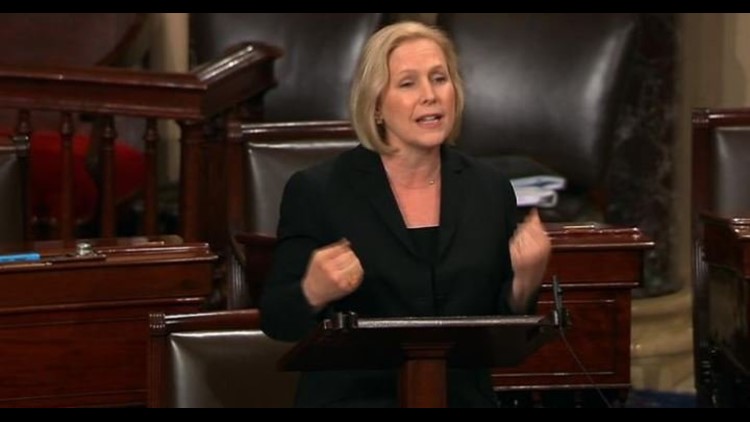The Senate has passed its long-stalled legislation that would overhaul how sexual harassment complaints are made and handled on Capitol Hill and would hold members of Congress personally responsible for paying such settlements out of their own pockets.
The legislation moved forward following a deal reached by Missouri Republican Sen. Roy Blunt and Minnesota Democratic Sen. Amy Klobuchar and praised by leaders of both parties in the Senate.
The bill now goes back to the House of Representatives, which passed its version in February and where the expectation is that there will be a conference committee to work out the differences between the two bills after Congress returns from its weeklong Memorial Day recess.
In an exclusive joint interview with CNN, Klobuchar and Blunt responded to criticism from outside advocacy groups about the bill, and said they hope to have a final bill worked out and passed this summer so that the President can sign it into law.
“We want to get this done — I would love to get it done this summer,” Klobuchar said.
Blunt said he has not talked to the White House about the legislation yet but sent a pretty direct warning that the President should sign the finished product Congress eventually sends to him and leave the negotiations around the bill that pertains to Congress to lawmakers.
“I am confident we’ll put a bill on the President’s desk and hopefully … in the near future, he’ll sign that,” Blunt said. “This is an area that the President should largely leave up to those of us it applies to and I think he will.”
The differences between the House’s and Senate’s versions of the legislation include the language used in describing when a member would be required to pay for settlements and when they would not. It also outlines guidelines for reporting settlements.
California Democratic Rep. Jackie Speier, one of the chief negotiators of the House’s bill said that there is “disappointment” in Senate’s bill among some members on both sides of the aisle in the House.
“We will go to conference and hopefully we can iron out some of those differences,” Speier said Thursday on CNN’s “New Day.”
There also is criticism of the Senate’s bill among some outside advocacy groups, which have written to Senate Majority Leader Mitch McConnell and Senate Minority Leader Chuck Schumer expressing concern that the House bill became essentially too watered down in the Senate’s negotiations.
“This bill contains numerous provisions that are contrary to key principles we’ve previously articulated, falls short of an acceptable compromise, and may have unintended negative consequences,” says a letter sent to Senate leaders signed by the American Civil Liberties Union, Equal Pay Today, The Leadership Conference on Civil and Human Rights National Women’s Law Center and Public Citizen.
Additionally, these groups say they see “significant differences” between the House and Senate bills and are “deeply concerned” that “neither senators nor key stakeholders have been given adequate time to fully vet the bill.”
The senators responded to some of that criticism that their bill is weakened version of the House’s bill which passed in February.
“Without being critical of the House bill, the House had about five days to work on their bill — we had 100 days to involve out colleagues in this discussion,” Blunt said. “And frankly I think our bill will stand the test of time longer than theirs would. But neither bill would be a final bill.”
Congressional sources tell CNN there are numerous areas that the discussion will center on when the two sides meet to work out a compromise.
Among the chief areas of concern: The provision for members being held personally responsible in the Senate bill states that they have to pay out of pocket only for sexual harassment, not for any awards that may be ordered for sex discrimination or any other kind of discrimination. Some fear that could provide a loophole for members who are accused of harassment to settle with a victim for sex discrimination, knowing that they won’t be required to pay the settlement and it will instead come out of a US Treasury fund.
The senators pushed back on the idea that the legislation falls short because of this delineation, which would lead to taxpayers still being on the hook for paying discrimination settlements.
“There are already laws against discrimination,” Blunt said. “Our focus here was not on trying to write a new set of laws just for the Congress of the United States.”
“This is about the individual action of a member and so that is what the focus was,” Klobuchar said,]. “I think it’s really important to know from a victim’s standpoint is that all the same rules apply to discrimination cases.”
Additionally, there is concern that the Senate’s legislation would empower and involve the Ethics Committee more so than the House’s. The Senate version would give the chair and ranking member of the committee the authority to overrule settlement repayments. The House bill would create a third-party investigatory process instead.
“This is a unique acceptance of personal liability,” Blunt said, noting that the settlement payment and also reporting provision would lead to “reputation damage” to the senator having to make the payment out of their own pocket.
Blunt said one potential compromise could be to let the House and Senate each do what they believe is best for their respective chamber.
“There is no reason that you can’t write a law where each of the two legislative bodies gets to decide what is best for their operation,” Blunt said, “This is a case where the House could easily do what it wants to do. And the Senate could easily do what it wants to do.”



